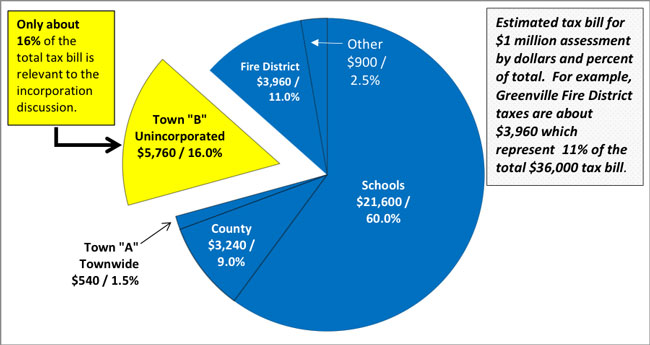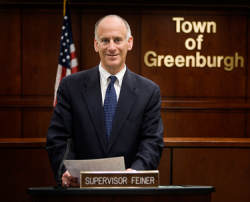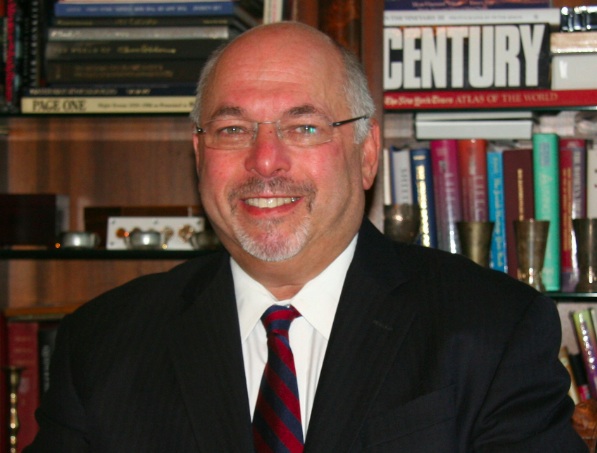Feiner Weighs Edgemont Petition to Incorporate
- Thursday, 13 April 2017 07:29
- Last Updated: Thursday, 13 April 2017 08:04
- Published: Thursday, 13 April 2017 07:29
- Joanne Wallenstein
- Hits: 5916
 After years of debate, a group of 1,440 Edgemont residents submitted a petition to the Town of Greenburgh to incorporate Edgemont as a Village on February 27, 2017. If Greenburgh Town Supervisor Paul Feiner certifies the petition, a referendum on incorporation will be held sometime between Memorial Day and late July. Only Edgemont residents will have the right to vote on the move, and proponents estimate that there are 4,800-4,900 eligible registered voters.
After years of debate, a group of 1,440 Edgemont residents submitted a petition to the Town of Greenburgh to incorporate Edgemont as a Village on February 27, 2017. If Greenburgh Town Supervisor Paul Feiner certifies the petition, a referendum on incorporation will be held sometime between Memorial Day and late July. Only Edgemont residents will have the right to vote on the move, and proponents estimate that there are 4,800-4,900 eligible registered voters.
The petitioners contend that an incorporated Village of Edgemont would do a better job of managing their finances and land use issues and that if they were incorporated Edgemont residents would have more influence and oversight of issues that affect them. Though their population of 7,565 residents represents 17.6% of the population, they pay 26% of the property taxes for the unincorporated area of Greenburgh. According to the feasibility study there are 2,784 households in Edgemont, including 1,893 single family homes and 891 multi-family units or condos. See a full financial plan for incorporation at Edgemont2017.org.
Leaders of the Edgemont Incorporation movement say that are not unhappy with their current services but object to the management of the Town of Greenburgh. If the referendum were passed, these leaders anticipate that they might even contract with the Town of Greenburgh for some of the services they would lose. If incorporated, Edgemont would need to arrange for their own police, public works, sanitation and library services. Edgemont residents could still use recreational facilities from the Town of Greenburgh with the exception of the Anthony F. Veteran Park. They would continue to be serviced by the Greenville Fire Department which would become a part of the new Village government. The Village would have the option of contracting with other municipalities or the county for some or all of these services.
The petition to sever ties with the Town of Greenburgh comes at a time when NYS Governor Andrew Cuomo has been pressuring local municipalities to do just the opposite; the state is advocating for local governments and school districts to consolidate to save on costs. The state imposed tax cap, state mandated increases in payments for health and retirement funds and cuts in grant funding to local governments have put extraordinary pressure on local budgets.
Before a referendum can be scheduled, Feiner would need to certify the petition and set a date for the vote. In the most recent development, Feiner hired private investigators to verify the names on the petition and residents complained that these investigators duped them into agreeing to invalidate their signatures.
Jeff Sherwin, speaking for the Edgemont Incorporation Committee, has urged Feiner to schedule the referendum before school goes out of session in June. In an open letter to Feiner he says, "holding the referendum when school is in session would maximize voter turnout, an outcome that represents democracy at its fundamental best and one for which you've advocated in other elections."
Below are letters from Greenburgh Town Supervisor Paul Feiner explaining his recent actions, and a response from Robert Bernstein who has been a long-time adversary of Feiner and a leader in the effort for to incorporate Edgemont.
A hearing is scheduled for April 24, 2017.
Letter to the Editor from Greenburgh Town Supervisor Paul Feiner:
Last week there was some media coverage which quoted some residents of Edgemont as being critical of me for my handling of the review of the petitions that have been filed with the Town seeking a referendum on incorporation. I understand how stressed out people on both sides of the Edgemont incorporation effort are and hope that this response will clarify the process.
The NYS Legislature recognized when they adopted the statute dealing with incorporation referendums, that the incorporation process could have significant impacts on many residents of the Town. That is why the process is difficult and requires significant oversight. If incorporation of Edgemont as a village within the town takes place ALL residents of unincorporated Greenburgh and Edgemont will be impacted.
If the petition complies with New York State law, residents of Edgemont would be entitled to vote on whether or not to incorporate and become a village. That referendum would take place in early summer.
My job is to determine if the petition is in compliance with NYS law. To help me make a decision that is based on law, not on politics, the Town acquired the services of a law firm that specializes in municipal law. Former New York State Appellate Division Judge Robert Spolzino (appointed by both a Republican and Democratic Governor) was retained by the Town to provide the Town with legal advice about the Edgemont incorporation petition.
Hiring Judge Spolzino's law firm was done in the best interests of the Town. After reviewing the incorporation petition, Judge Spolzino believed it was prudent to engage investigative services to randomly interview individuals that signed the incorporation petition to determine if the signatures obtained were acquired pursuant to NYS law. While the investigators did act as agents of the Town, the Town had no control over the selection of the investigators or the questions they asked.
I encourage every resident of the Town to review the NYS village law section 2-206 which speaks to the legal requirements of the proceeding for hearing objections to the incorporation petition. Several attorneys reviewed the statute and concluded that the scope of the hearing was narrowly tailored to hearing objections to the petition. The statute does not state that the petitioners have an opportunity to speak about the merits of incorporation and says nothing about the right of residents to respond to objections raised. If the Legislature wanted the hearing to be typical of hearings - they would have expressly included it.
I have been in contact with Judge Spolzino and have asked him to come up with rules for the adjourned hearing which will be held on April 24, 2017 at Greenburgh Town Hall at 7:30 PM so that incorporation advocates can respond to the objection affidavits. I recognize that if those who disagree with the objections are allowed to testify they will only be able to focus their comments on the specific objections. I believe that hearing from both sides will help both Judge Spolzino and make a decision based on law whether the petition is in compliance. Rules for the April 24th meeting will be released early next week.
I am very committed to following the letter of the law during Edgemont's incorporation attempt. I have told Judge Spolzino to base his advice decision on the law - not on what he thinks I want to hear. I also recognize that this issue has divided our community in a very negative manner -and has pitted neighbor against neighbor. I am committed to working hard to be responsive to the concerns of every Edgemont resident -whether you support or oppose the incorporation. I hope that we will all work together to make Greenburgh a great place to live.
I recognize that there are two separate issues. One is process which is being outlined in this memo. The second is substance --Edgemont residents concerns about taxes, land use, quality of schools, property values, services. I will work hard to be responsive to the Edgemont community. And, am more than willing to reach out to the community and to residents of Edgemont to have a better appreciation of your concerns.
Letter from Robert Bernstein:
Dear Supervisor Feiner:
On behalf of the Edgemont Community Council, we take strong exception to the procedures being followed to determine whether the Edgemont Incorporation Committee's petition for incorporation is legally sufficient.
The petition was filed February 27, 2017. On its face, it satisfied all the statutory requirements. Thus, it stated that it included the signatures of at least 20% of the regular inhabitants in Edgemont who are qualified to vote for town officials, it included a list of such regular inhabitants, and it included a metes and bounds description of the Greenville Fire District that was reviewed and approved in 1923 by the Westchester County Board of Supervisors, thus satisfying the requirement that the boundaries of the proposed village be described with "common certainty."
Village incorporation law gave you up to 20 days to figure out whether the petition on its face satisfied the statutory requirements, at which time you were required to give legal notice that the petition had been filed, and that a public hearing would be held to consider its legal sufficiency.
Your giving legal notice of the public hearing meant that you had reviewed the petition during that 20-day period and determined that it was indeed legally sufficient. This is not just my opinion; this is what one New York court after another has said.
That's when the process went off the rails. You decided (either on your own or through counsel) to hire at taxpayer expense a Manhattan private investigative firm to enter the homes of Edgemont residents who signed the petition to try to obtain evidence by which the petition could be declared invalid. There is zero precedent in New York for doing that.
You next decided that the public hearing would allow testimony only from those objecting to the petition. You state that the statute "says nothing about the right of residents to respond to objections raised" – but the statute does say so.
It says that "[t]estimony as to objections may be taken at the hearing" and that "[t]he burden of proof shall be on the objectors."
The phrase "as to" in plain English means not that only those who object may testify, but that the subject matter of the testimony is limited to the objections. That means you can and should have heard from those who submitted the petition.
And the words "burden of proof" usually means one side has more evidence in its favor than the other. Not only does that imply both sides should have an equal opportunity to be heard, but in this case the village incorporation law favors petitioners' right to vote because the burden of proof to show otherwise is on the objectors.
But if you continue to believe that no one may speak at the public hearing to explain why the objections are not among those that may be raised, or if they may be raised, are not supported by the evidence, and you then refuse to certify on the basis of what you've heard only from one side, then you are manipulating the process to deprive Edgemont residents of their right to vote – in violation of the statute and, because of your conduct, the First Amendment too






